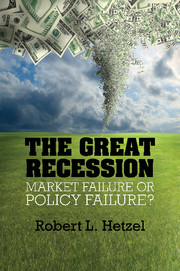Book contents
- Frontmatter
- Contents
- Figures
- Tables
- Preface
- One The 2008–2009 Recession
- Two Recessions
- Three The Great Contraction
- Four Monetary Policy and Bank Runs in the Great Depression
- Five Vigorous Recovery and Relapse
- Six Interwar International Monetary Experiments
- Seven Identifying the Shocks that Cause Recessions
- Eight From Stop-Go to the Great Moderation
- Nine Controlling Bank Risk Taking
- Ten The Housing Crash
- Eleven Bubble Trouble
- Twelve What Caused the Great Recession of 2008–2009?
- Thirteen What Caused the Great Leverage Collapse?
- Fourteen The Distinctions Between Credit, Monetary, and Liquidity Policy
- Fifteen Fed Market Interventions
- Sixteen Evaluating Policy
- Seventeen The Business Cycle
- Eighteen Why Is Learning So Hard?
- Nineteen How Should Society Regulate Capitalism?
- Postscript
- Bibliography
- Index
Eighteen - Why Is Learning So Hard?
Published online by Cambridge University Press: 05 May 2012
- Frontmatter
- Contents
- Figures
- Tables
- Preface
- One The 2008–2009 Recession
- Two Recessions
- Three The Great Contraction
- Four Monetary Policy and Bank Runs in the Great Depression
- Five Vigorous Recovery and Relapse
- Six Interwar International Monetary Experiments
- Seven Identifying the Shocks that Cause Recessions
- Eight From Stop-Go to the Great Moderation
- Nine Controlling Bank Risk Taking
- Ten The Housing Crash
- Eleven Bubble Trouble
- Twelve What Caused the Great Recession of 2008–2009?
- Thirteen What Caused the Great Leverage Collapse?
- Fourteen The Distinctions Between Credit, Monetary, and Liquidity Policy
- Fifteen Fed Market Interventions
- Sixteen Evaluating Policy
- Seventeen The Business Cycle
- Eighteen Why Is Learning So Hard?
- Nineteen How Should Society Regulate Capitalism?
- Postscript
- Bibliography
- Index
Summary
Learning the lessons of the experience with regimes of fiat money has been slow in part because of the lack of a dialogue between the academic community of economists and the policy makers of central banks. The major impediment to such a dialogue is the unwillingness of the Fed to advance as the starting point for dialogue a conceptual framework explaining what variables it controls and how it exercises that control. Economics imposes the discipline required to learn about the structure of the economy and the way in which monetary policy affects economic activity. Policy makers should initiate an ongoing dialogue with the academic community using the language of economics. In such a dialogue, the Fed should be willing to discuss the conceptualization of a central bank as a creator of money and should be willing to reconsider its adherence to discretionary as opposed to rule-based policy making.
CONCEPTUALIZATION OF A CENTRAL BANK WITHOUT REFERENCE TO MONEY CREATION
At the conclusion of its November 3, 2010, meeting, the FOMC announced:
Currently, the unemployment rate is elevated, and measures of underlying inflation are somewhat low, relative to levels that the Committee judges to be consistent, over the longer run, with its dual mandate. Although the Committee anticipates a gradual return to higher levels of resource utilization in a context of price stability, progress toward its objectives has been disappointingly slow. To promote a stronger pace of economic recovery and to help ensure that inflation, over time, is at levels consistent with its mandate, the Committee decided today to expand its holdings of securities. … [T]he Committee intends to purchase a further $600 billion of longer-term Treasury securities by the end of the second quarter of 2011, a pace of about $75 billion per month.
- Type
- Chapter
- Information
- The Great RecessionMarket Failure or Policy Failure?, pp. 330 - 341Publisher: Cambridge University PressPrint publication year: 2012



